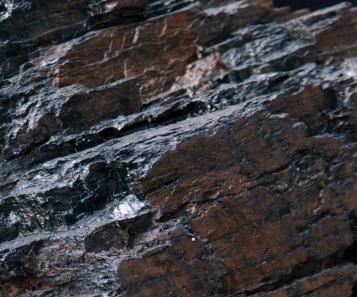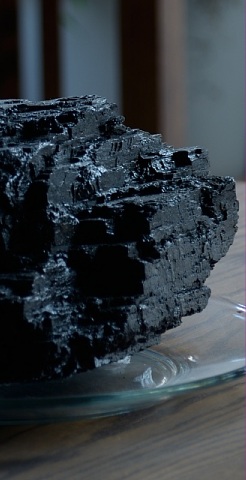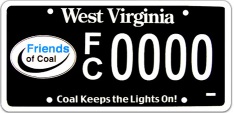 hen outsiders think of West Virginia, they think of skiing resorts, rolling hills,
rustic barns with Chew Red Man Tobacco painted on the side, leaves turning red and
yellow in the fall, and old people sitting on rocking chairs on their front
porch, their dog sleeping by their side, with a shotgun across their laps, ready to
shoot anybody who comes too close and boil them up in a pot of vichyssoise like in
the movies.
hen outsiders think of West Virginia, they think of skiing resorts, rolling hills,
rustic barns with Chew Red Man Tobacco painted on the side, leaves turning red and
yellow in the fall, and old people sitting on rocking chairs on their front
porch, their dog sleeping by their side, with a shotgun across their laps, ready to
shoot anybody who comes too close and boil them up in a pot of vichyssoise like in
the movies.
I thought the same where I grew up, quite a ways north of here. Where I lived it was a lot colder—a thermometer that only goes down to −20°F was considered useless in those parts—but we didn't consider ourselves poor. The poor ones were the neighbor family's children who used to break in and steal our food.

53 of the 55 counties in West Virginia have coal. Coal accounts for 60% of the business taxes paid in the state.
The people in coal country don't consider themselves poor either. All they know is they're always being slammed and insulted by Manhattan elites as the land of trailer homes and home of the overweight. They're mightily pissed about it, and I don't blame them. Telling someone they're poor is an act of aggression. You are not poor until you think you're poor. These folks are making them poor.
In a cruel twist of fate West Virginia was where I ended up. It might not be my first choice of a place to live, but in my profession we go where the diseases are, and for us West Virginia is a target-rich environment. There's not much culture here—only peace and quiet—but if you're looking for patients with COPD, it is (as the tune goes) almost heaven.
Just after I moved here someone kicked in my front door and stole my watch and some cash but left a freezer full of frozen steaks, three boxes of Club Crackers, and two packages of wieners completely untouched. That's the difference between stealing from poverty and stealing from greed. If they're greedy they steal your TVs, your watch, and (in rural areas) your chainsaw. If they are truly poor they head straight for your wieners.
In rural America today you need deadbolts to keep out the deadbeats. Most of the people are dead honest, but to keep out the druggies I had to install two Medecos on every door and quarter-inch steel strike plates bolted to a solid steel and oak-reinforced door frame, Lexan, and expanded steel mesh bolted over the basement windows. Yet I still get screwdriver marks on my front door.

Bituminous coal specimen. West Virginia produced 144 million tons of coal in 2009.
The locals have devised their own solution to crime: don't own anything valuable. Some can afford ATVs but don't bother buying tools, especially chainsaws, because you can't keep them for long, so dead trees fall across the road all the time. The County comes along and matter-of-factly cuts them up and throws them back into your front yard.
But the people are really nice. And I'm not just saying that because otherwise people will come over and beat me up.
And they love coal. Pennsylvania has those strange license plates with color pictures of things like Bengal tigers and rusty steam engines. West Virginia has the black ones with a swoosh logo on it that says “Friends of Coal.”
Many people work in the coal industry, especially in the southern part of the state. I once hired a contractor, an out of work coal miner, to dig a trench. It was impossible for a scrawny academic like me to dig more than an inch per hour through the rock-hard clay by hand, even with a pick. This man drove six hours with his backhoe to do the work. A motel was too expensive so he slept in his truck overnight, his clothes probably still covered with mud and sweat. Finding coal on my property, he asked if he could take it home with him.
Folks, that is poverty. For me, finding a big chunk of coal lying under a pile of leaves in my back yard next to a 300 pound rusty cast iron bathtub and a spool of rusty barbed wire was a spectacular prize, a mineral specimen to be cleaned and displayed on my coffee table. For this man it was a way to keep his house warm so he wouldn't die. Packing up his trailer and moving to Silicon Valley and becoming a computer circuit designer was not an option.
It is beautiful here, but despite the relative absence of police compared to places like nearby Cumberland, Maryland, where the cops sit in hiding along the Interstate like gray mountain lions waiting to pounce, there is a pervasive feeling of not being free. Even my co-workers, all Ph.Ds, cannot escape. Almost all are or were H-1Bs, brought in because they work cheap. But they're just as trapped as the locals. The government's H-1B program has been disastrous for scientists.
Our lab was brought here by a politician hoping to raise the status of his state. When it goes under, the American scientists will have to leave science, thanks to the flood of H-1Bs. The foreign scientists will have to go back to their home country. But at least they can afford to rent a U-Haul.

Friends of Coal License Plate. Kentucky also has these.
The locals can't. They're trapped by poverty, age, poor health, lack of skill, lack of education, and lack of ambition. The median age is 40.3, the third highest in the nation. They are second in obesity at 35.7%. Around here new roofs leak within a year of being installed. Tire dealers install a new tire and it goes flat within a month. I learned right away not to throw pennies in the trash, lest they get fished out by staff and I get lectured about wastefulness.
Unlike in Manhattan, there is no two-hour Amazon delivery. The police take an hour to arrive, if they can find your address at all. The garbage company sometimes picks up people's garbage, and sometimes not; every day as I drive to work I see the same bags of garbage along the road being picked apart by crows.
This is life in coal country. West Virginia is the only state that seceded from the Confederacy. They started out a little poorer and they stayed the same while the other states became rich. Now the government's attacks on coal are wrecking what's left of their economy. And it has made them politically aware. A local bar, just a short ways away from the local strip joint, which is perennially advertising for “dancing” talent—a good opportunity if you're not a 55-year-old chain smoker with a chronic cough—put the words “SOCIALISM SUCKS” on their dingy letterboard sign.
West Virginia is 49th in terms of median household income ($38,029) and dead last in labor force participation rate (49.7%) but number one in severe stress. It is the most miserable state in the country. But it's number two in the number of flu vaccines for adults, right behind South Dakota. It also has the world's largest Jello mold which doubles as a football stadium, and it is the home of the beloved Hare Krishna cult.
The IMF places West Virginia's overall economy between Iraq and Libya, two countries whose economies were wrecked by the Federal government. It seems appropriate. We are also last or second last in twenty health categories including prescription drug overdose, drug deaths, teeth loss, cancer, and diabetes. It is the only state where death rates exceed birth rates.

West Virginia is not just coal. It also has many cell towers and, occasionally, snow
But you might be surprised to learn that the biggest private employers in 2015 were not coal companies or undertakers but Wal-Mart, WV United Health System, Charleston Area Medical Center, Kroger (a grocery store chain), and Mylan Pharmaceuticals. Murray American Energy, a coal mining company, is only sixth. While 45,284 people in West Virginia are employed in advanced technology industries, only 30,000 are employed by the coal industry and 21,600 (2.4% of the work force) by the state university.
It also has the best ski resort in the Mid-Atlantic/Southeastern US. Its state university held the title of best party school for many years until it was displaced by Wisconsin. And they are up to their earballs in wind turbines.
I would add they also have some of the most polite drivers in the world: when a flock of wild turkeys inches its way across the rural pothole-filled roads, the drivers wait patiently for the fifteen minutes it takes them to cross. When a streetlight turns green, the cars in line politely wait for the driver of the car in front to wake up, almost never honking even if it means waiting for two or more cycles. When it snows they drive at 1½ miles an hour in enormous traffic jams as if waiting for the snow to melt. Honking one's horn is considered the mark of a rude out-of-stater who is in a hurry to get somewhere. Those who wanted to get somewhere, and had someplace to go, went there years ago.
Even if the rest could afford to follow, for many—the disabled, the old, and the uneducated—there is no place to go. People around here don't talk about the government destroying the country any more. For them it has already happened.
What they crave is respect. What they need is education. What they get is that great destroyer of civilizations: government welfare. If the government offers them money, they will take it. But without an educated workforce to provide an infrastructure, corporate investments will fail. And the federal government, cackling gleefully about destroying their livelihood, grinds its evil boot in their face, and the urban elites, whose currency is social status, sneer at them.
Some people might think the solution is easy: give up. Rent yourself a U-Haul, load up the truck, toss the wife in the back, pick up your dog, sell your shotgun, and move to Beverly Hills and get a damn job. Move to Stamford, Connecticut or Alexandria, Virginia and take a job digging sewer lines there instead of in Sissonville or Huntington.
If I asked that old coal miner if he would take a free mansion, a free Maserati Quattroporte, and a million bucks he'd probably say yes. If I told him he was poor and that California's the place he oughtta be, he'd probably think I was just being a tad arrogant. And if I asked him if he was unhappy and suggested that he move somewhere else he'd probably say it aloud: you is nuts, git on outta here.
Do the calculations yourself. Same job, same pay, living expenses doubled, and surrounded by nasty city dwellers, and living the rest of your life knowing you left your family and friends and gave up on your home town. I have never heard a poor West Virginian swear, but I can imagine what he'd say.
The locals are accustomed to being sneered at by city folks. But calling them malicious and their culture vicious, or saying their community deserves to die because you don't like the candidate you think they support, as some commentators do, is not constructive.
As I said upblog, nobody ever told us we were poor. But we must have been; otherwise, why would my relatives have made such a big deal about small things, like the time we bought a new thermometer, and why do I so clearly remember the excitement of it so many years later?
The human brain can adapt to almost anything. That is why we're susceptible to moral relativism. Relativism is not a human problem just because we're so adaptable we can adapt to evil. It's a human problem because adapting to evil is evidence of our lack of moral compass.
It might sound crazy to someone with a background in economics, but isn't it possible there could be people who aren't Homo Economicusses? People who actually like living in places like this, even knowing that a strong wind on some stormy winter day could send their house rolling down the Interstate with their dog chasing down the road behind them? People who don't want to give up?
You're not poor until you think you're poor. Telling a man or a woman they're too dumb to make it on their own might just be the cruellest thing one human being can ever say to another. If you sneer at a people often enough, you can beat them down for a time. If you call them lazy and uneducated they might even accept that as the truth. But you should not then be surprised if someday they rise up, assert their own values, and tell you to piss off.
If you tell someone they need government assistance to survive, it's your way of telling them they are helpless. We always say there was a time when a man or a woman wouldn't take kindly to someone telling him those things. And maybe we should be glad there are still places where they don't.
last updated mar 24 2016 5:36 am

